I see it more and more often these days. I see it on Twitter, on Facebook, and sometimes even in the real world: People complaining about politics in a creator’s stories. Usually, they’re offended because the creator’s politics don’t align with their own, but sometimes, they’re offended because there’s politics in there at all. Oh my God, this comic contains a Muslim! Oh my God, this comic has someone expressing a political belief! Oh my God, this comic references God!
Inevitably, someone will complain that politics don’t belong in superhero comics, and that all these pesky writers and artists should just keep their opinions to themselves and just tell some superhero adventures, already.
It’s a stupid thing to say. Because, and I can’t believe that I actually have to point this out to people…
Politics have always been a part of superhero comics.
Politics were there from the very first Superman story in Action Comics #1, that started with Superman racing to the Governor’s mansion to save a falsely condemned man, continued with him roughing up a wife beater, and ended with him terrifying a corrupt lobbyist.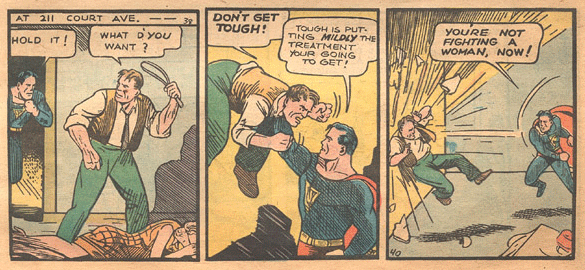
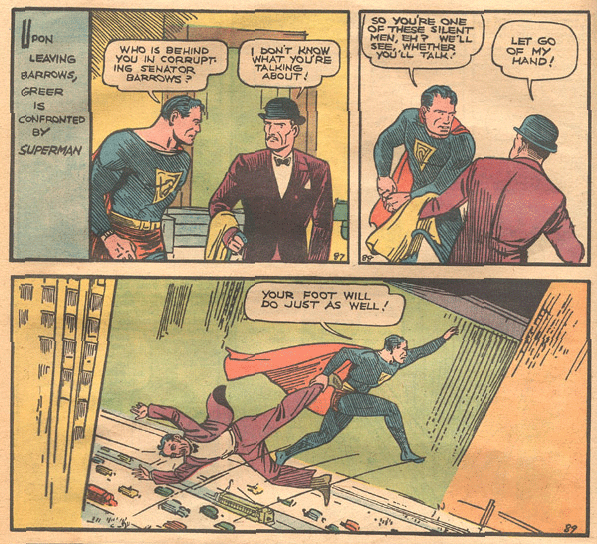 They were there from Simon and Kirby’s first issue of Captain America in 1941, where Cap was shown punching out Hitler before the U.S. entered World War II.
They were there from Simon and Kirby’s first issue of Captain America in 1941, where Cap was shown punching out Hitler before the U.S. entered World War II. They were there in the original Wonder Woman stories of William Moulton Marston and H.G. Peter, where Wonder Woman preached female equality to her readers, decades before the E.R.A.
They were there in the original Wonder Woman stories of William Moulton Marston and H.G. Peter, where Wonder Woman preached female equality to her readers, decades before the E.R.A. They were there during World War II, when Jerry Siegel and Joe Shuster did a piece for Look magazine about how Superman would end the war by bringing Hitler and Stalin before the world court in Switzerland.
They were there during World War II, when Jerry Siegel and Joe Shuster did a piece for Look magazine about how Superman would end the war by bringing Hitler and Stalin before the world court in Switzerland.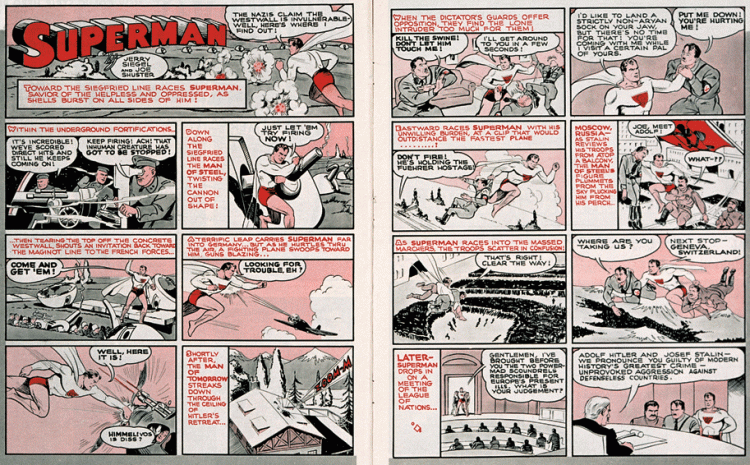 They were there in 1946, when Stetson Kennedy and the producers of the Superman radio show used secret KKK passwords on the show to expose the KKK as the racist fools they were. There’s even been an entire book written about it, Superman Versus the Ku Klux Klan.
They were there in 1946, when Stetson Kennedy and the producers of the Superman radio show used secret KKK passwords on the show to expose the KKK as the racist fools they were. There’s even been an entire book written about it, Superman Versus the Ku Klux Klan.
They were there in the 40s and 50s, when National Comics put socially-conscious ads starring Superman and Batman into their books.
 They were there in the early days of Marvel Comics, where the heroes were fighting dirty commies and every other villain was taking his orders directly from the Kremlin.
They were there in the early days of Marvel Comics, where the heroes were fighting dirty commies and every other villain was taking his orders directly from the Kremlin.
 For crying out loud, Iron Man’s origin has an American munitions manufacturer fighting an evil warlord in Vietnam. You don’t get much more political than that.
For crying out loud, Iron Man’s origin has an American munitions manufacturer fighting an evil warlord in Vietnam. You don’t get much more political than that.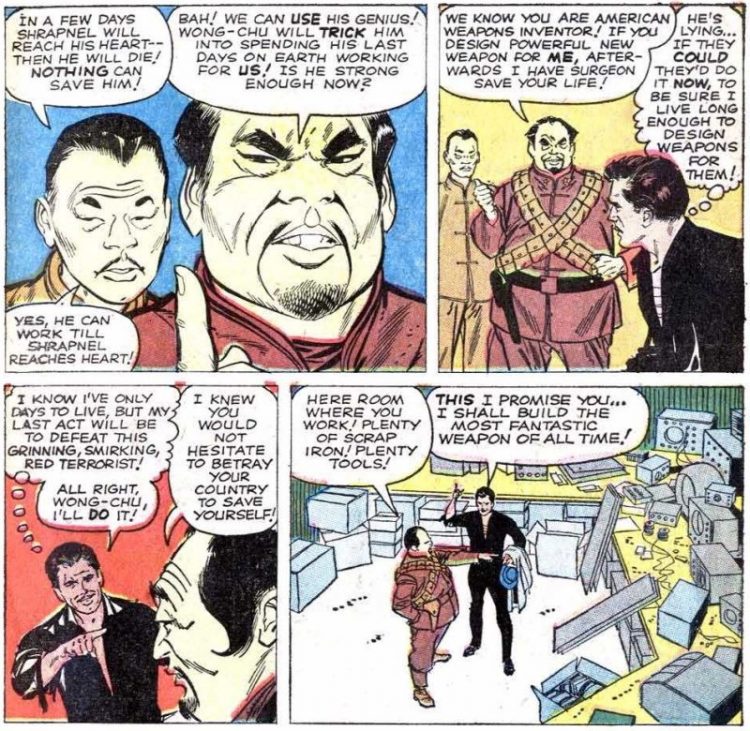 Stan Lee and Steve Ditko had Peter Parker encounter some campus protesters in a mid-60s issue of The Amazing Spider-Man. This is a very interesting sequence for what it reveals about Steve Ditko and Stan Lee’s contrasting political beliefs, by the way. If you just look at the art, you can tell that Ditko clearly intended for Parker to be looking at the protesters with disdain, while Lee’s dialogue has Peter greeting the situation with more general bemusement, only becoming irritated when the protesters start hassling him personally.
Stan Lee and Steve Ditko had Peter Parker encounter some campus protesters in a mid-60s issue of The Amazing Spider-Man. This is a very interesting sequence for what it reveals about Steve Ditko and Stan Lee’s contrasting political beliefs, by the way. If you just look at the art, you can tell that Ditko clearly intended for Parker to be looking at the protesters with disdain, while Lee’s dialogue has Peter greeting the situation with more general bemusement, only becoming irritated when the protesters start hassling him personally.

In the early 70s, Steve Englehart wrote a story arc where Captain America discovered that the leader of the evil Secret Empire was actually a high-ranking government official, paralleling the country’s disillusionment post-Watergate. The X-Men only became more political with time, as the subtext of anti-mutant prejudice became more pronounced and Professor X and Magneto eventually evolved into the Martin Luther King and Malcolm X of the mutant world.
The X-Men only became more political with time, as the subtext of anti-mutant prejudice became more pronounced and Professor X and Magneto eventually evolved into the Martin Luther King and Malcolm X of the mutant world. Denny O’Neil and Neal Adams’ Green Lantern/Green Arrow tackled a whole host of political issues and social ills.
Denny O’Neil and Neal Adams’ Green Lantern/Green Arrow tackled a whole host of political issues and social ills.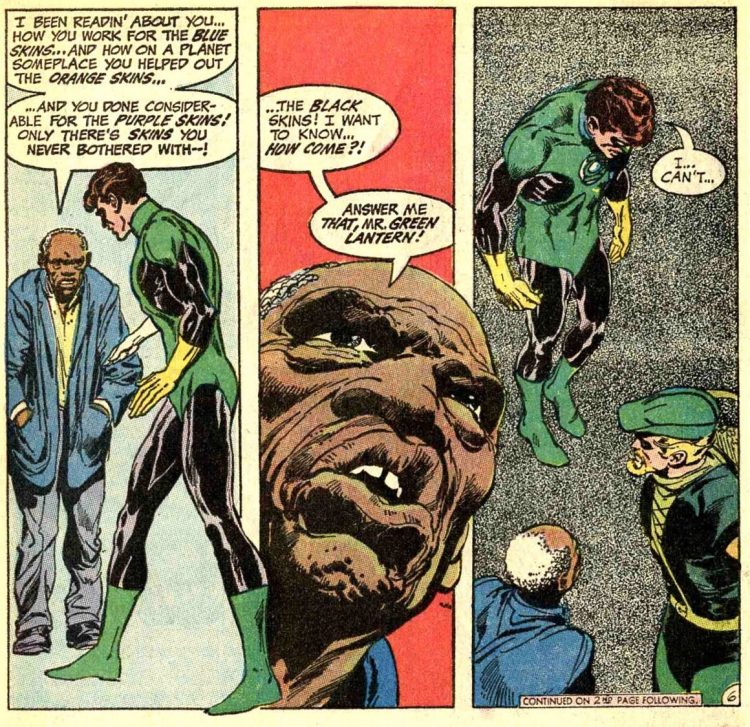 The Dark Knight Returns is as much about the Reagan era as it is about Batman.
The Dark Knight Returns is as much about the Reagan era as it is about Batman. Commissioner Gordon even makes a speech about FDR and Pearl Harbor.
Commissioner Gordon even makes a speech about FDR and Pearl Harbor. Watchmen looks at the political ramifications of superheroes, with fifth-term President Richard Nixon using Dr. Manhattan to win Vietnam and keep the Russians at bay.
Watchmen looks at the political ramifications of superheroes, with fifth-term President Richard Nixon using Dr. Manhattan to win Vietnam and keep the Russians at bay. John Ostrander’s version of the Suicide Squad showed that the politicians of the DCU had their own Iran-Contra style shady dealings, with the U.S. government authorizing the use of supervillains as a dirty tricks squad.
John Ostrander’s version of the Suicide Squad showed that the politicians of the DCU had their own Iran-Contra style shady dealings, with the U.S. government authorizing the use of supervillains as a dirty tricks squad.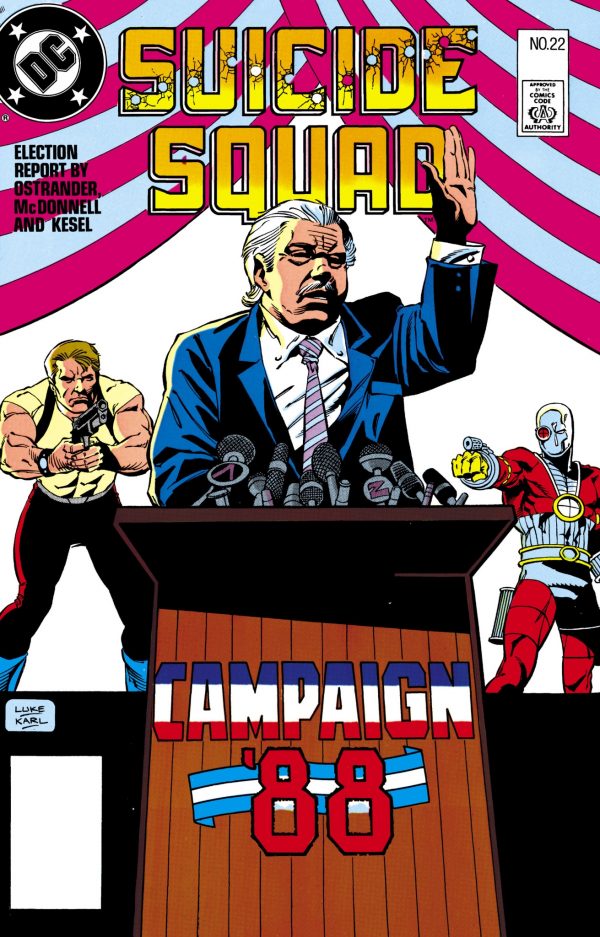 And let’s not forget all the political superhero comics we saw in the wake of 9/11.
And let’s not forget all the political superhero comics we saw in the wake of 9/11.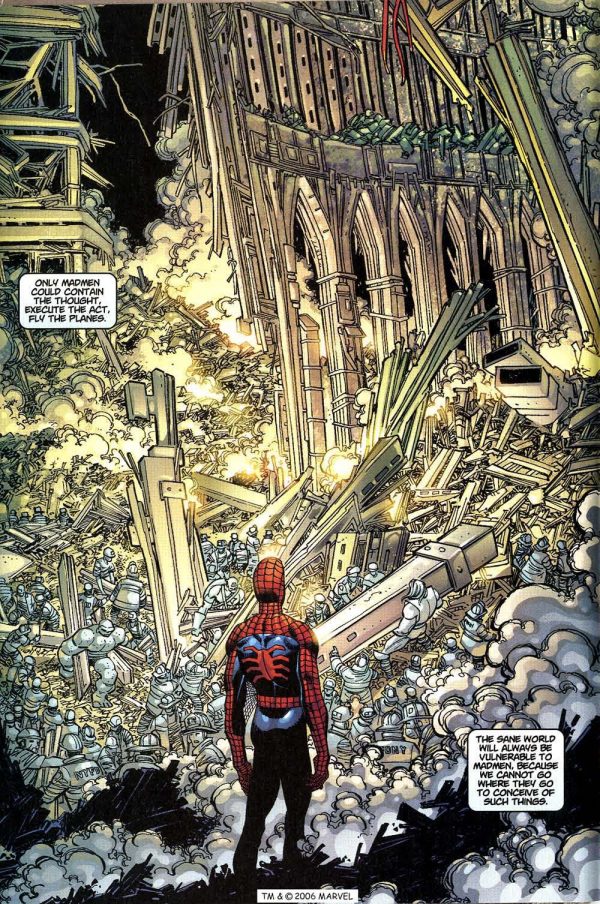
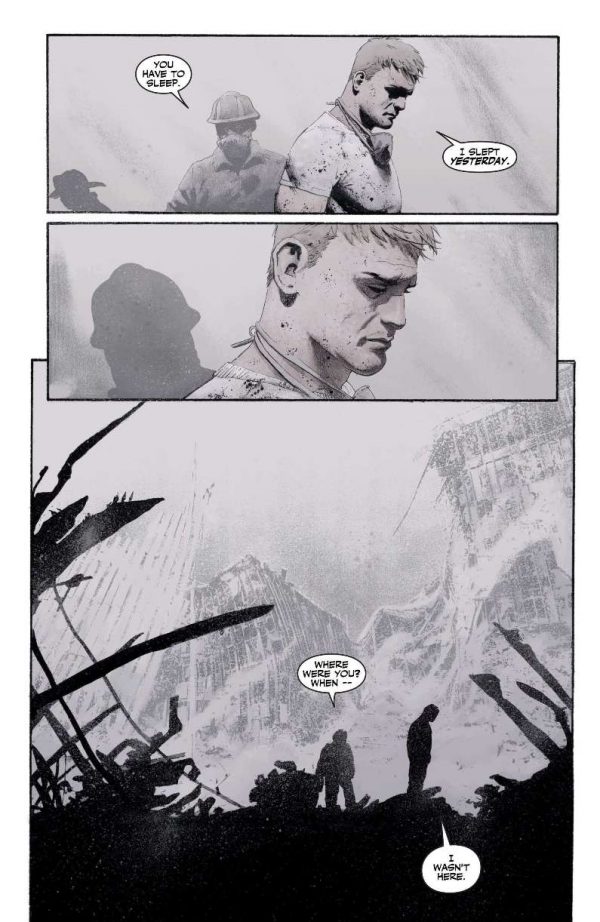 Ex Machina, which I really should do a full column about one of these days, had politics weaved into its DNA, as New York City Major and ex-superhero Mitchell Hundred saved one of the Twin Towers on 9/11 and dealt with issues ranging from gay marriage to school vouchers.
Ex Machina, which I really should do a full column about one of these days, had politics weaved into its DNA, as New York City Major and ex-superhero Mitchell Hundred saved one of the Twin Towers on 9/11 and dealt with issues ranging from gay marriage to school vouchers.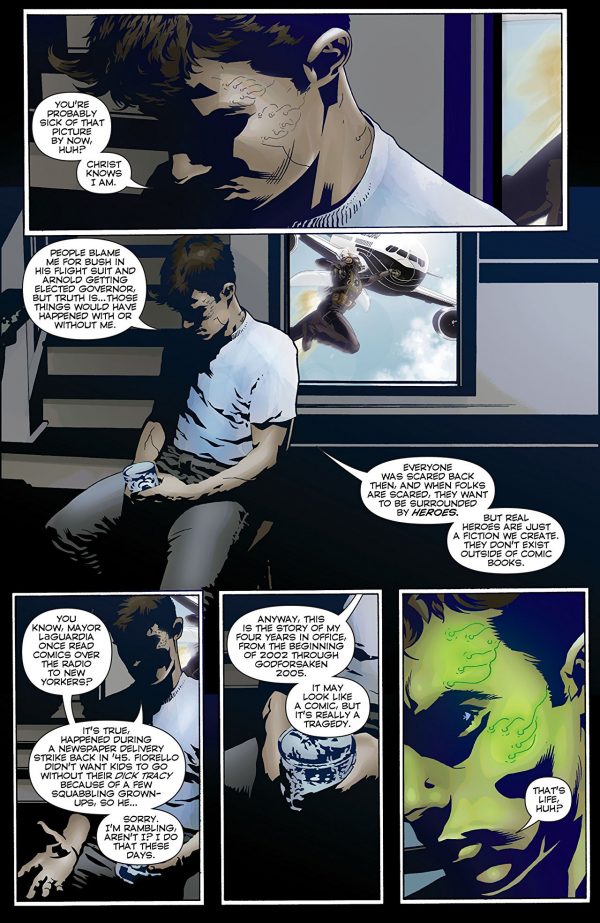
Hell, 16 years later, we’re still feeling the effects of 9/11 in superhero comics, with titles like Civil War and Identity Crisis reflecting the unease the American people feel with our own government.
And that’s just superhero comics. There’s lots of others, like V For Vendetta, Maus, Persepolis, and Fax From Sarajevo, that deal with politics even more overtly.
One of the books I grew up reading was Mike W. Barr and Jim Aparo’s Batman and the Outsiders. Barr was never shy about tying his stories in with politics or the events of the day, and it made the series all the more interesting. Sometimes readers took Barr to task for this on the letters page, where he was even more outspoken. Barr’s response to one such letter has stuck with me ever since I first read it 30+ years ago, and I looked it up again in The Outsiders #4 so I could quote it here:
Sorry, Bob, but comic books are written by people–at least, this one is–and people have opinions, some of which are bound to pop up in their work now and again, as mine did in the story for BATO Annual #1, which started all this mess. A writer who doesn’t have opinions isn’t writing stories, he’s making pablum.
So no, you can’t get politics out of superhero comics. Politics are baked into the genre. Superheroes were the original Social Justice Warriors.
So can we please stop pretending that politics don’t have a place in comics?


For me, the problem isn’t whether or not politics show up at all, or whether I agree with them or not. (If I don’t, it makes it worse, I admit.)
It’s that the same politics show up again and again and again and again; and they’ve been dominating certain books for a while now, and they’re usually heavy-handed and hypocritical. Or simplistic or badly-handled; usually it comes down to ‘if you don’t do what we tell you, you’re a scumbag terrorist’.
In fact, I’ve started saying ‘the more I read from the left, the further right I lean’ because of the *way* politics are handled in media.
That Green Lantern / Green Arrow example (and that whole run, later) was a particularly bad example. “You helped out the orange skins and you done considerable for the purple skins! Only there’s skins you never bothered with…! The black skins! I want to know… How come?”
The correct answer, of course, is: “You know all those many, many times I’ve saved this entire planet? Or helped the JLA do the same? I think that helped out the black skins somewhat – just as much as orange or purple before.”
In addition to the overt politics in the example you list, there’s also more politics that goes unremarked in the story. For example the Captain Future pulps (which I love) take it as a given that Earth exercising a British Empire-style dominion over primitive tribes on other Solar System worlds is acceptable. It’s not spelled out overtly, but whenever the tribes rise up against Earth control, it’s always because an outside agitator has made them think humans are the enemy. Then Future busts the bad guys and presto, the tribes go back to being happy colonials.
By contrast Edmond Hamilton’s “Conquest of Three Worlds” is explicitly anti-colonial, but his Future work is just as much a political statement.
You can add the early Uncle Sam comics (by Will Eisner) from Quality, where he first fights a Bundist conspiracy and also protects union workers. Then there is Blackhawk, a comic about men from conquered lands coming together to fight the Nazis, while in exile. There is American Flagg, which transposed the political corruption of Chicago into the future, while adding social commentary about violence as entertainment, consumer culture, intrusive advertising, sensationalist info-tainment and a host of other themes. Scout goes into environmental and cultural destruction, political manipulation from religious conservatives, racism, and Cold War geopolitics. Little Orphan Annie regularly featured a plutocrat war profiteer lecturing the unemployed and destitute )mostly as a result of rampant speculation by Warbucks’ crowd) about self-reliance. Then there is Ditko’s entire body of personal work after leaving Marvel (The Question, Mr A, Killjoy, etc…)
What bugs me is when the character’s politics are inconsistent, because of changing creative teams, if it is central to the character. Captain America suffered a bit from this over the years; but, then again, he also fit political moods of the era. It’s a bigger deal when I see Jonathan Kent telling young Clark that he shouldn’t have helped people in trouble, which is less about politics and more about a complete misreading of a long established character.
Jonathan Kent in Man of Steel is absolutely about politics; he’s mouthing the platitudes of Randian Objectivism, an odious political philosophy that has become deeply embedded in American politics, starting with Alan Greenspan’s governance of the Federal Reserve, which contributed greatly to the global economic meltdown of 2008.
Yeah, to go with what’s said here, the problem comes when it’s really falls into the two categories mentioned here, and they’re merged. One, when it’s endlessly one sided. And in particular when it doesn’t fit the character very much at all. You get a lot of this with Tony Stark, because writers seem to be unable to figure out a way a corporate big wig could be anything but a villain. When he’d be the least liberal guy this side of the Punisher of the major characters. Maybe Batman, too, since he was born rich AND thinks it’s a good idea to beat up criminals to within an inch of their life.
It goes both ways. That Spider-Man panel is funny. Peter might be a bit socially conservative, because he’s probably not to hip to things, and he was raised by a much older couple, but in rights and feelings he’d be pretty liberal. But usually it’s “how do I turn this guy who might be even a little conservative to speaking my viewpoints?” You know, other than the Punisher, because we can’t fix that, so he’s just a villain we write comics about. (See the Netflix surrounding hub bub).
The problem is too, you look at the background of most of the characters, and they’d probably be middle of the road politically, and nuanced. But the vast majority of the writers aren’t really middle of the road themselves. Spidey, as above. Cap, who was probably pretty liberal for a guy from the 1940’s, so in some views he’d still be and others not so much. Superman, who had very altruistic, but grew up on a farm in Kansas. And so forth. Which is the problem with a lot of media, both entertainment and “news,” because the majority of people still fall in the middle somewhere. But all the “noise” seems to come from the extremes, the us vs. them crowd.
The whole thing is hard to put together too, because while Superheroes have always been fighting for the little guy, which seems like a more liberal tact, they’ve been doing it using ultra conservative means – vigilantism. Sure there was a time Batman was deputized, but for the most part they’re doing stuff outside the law and breaking it. And doing it by beating people up. There aren’t too many liberal politicians who are going to be OK with that, and most would be trying to put them behind bars. So how to make it OK?
But again, if it fits the character it’s ok. When you twist it around then it stands out. Civil War? They made everything backwards just so the right side could appear to be the good guys. And it was never as fairly portrayed as they pretended it was. There’s no way Iron Wars Tony Stark is suddenly going to be OK being a stooge of the government. And Captain America who has spent most of his adult life as a government agent is going to be all don’t control me. But Cap has to be the good guy and Tony the bad guy. And funny part of it is they even reverse the probability that if someone was going to want to put people under government control for those reasons, it’s probably not a totalitarian conservative government doing it, but a liberal one. The don’t control me/don’t tread on me concept in that story is very libertarian. Now if suddenly the government wanted to control what religion you practiced….
Civil War entirely ignored that Cap is a federal agent serving at the will of the government. Quite aside from how that would shape his own stance, it also makes it pointless to demand he register.
Airboy is an interesting study in political writing. Chuck Dixon is best known lately for his anti-gay stance (and for suggesting we bring back the Comics Code) but the letter columns routinely castigated him for his unAmerican view that US-backed dictatorships are a bad thing. How much of that is being more liberal on some issues than others, how much the negotiation with his much more liberal editor I don’t know (though the last couple of TPBs discuss some of that for the issues collected therein).
In Civil War, I thought the registration we were told about was a perfectly decent policy – ‘If you’re going to beat up and arrest criminals, we want you trained up and registered’.
The registration we got was not – ‘If you have powers, we’ll arrest you for not registering, even before it’s possible for you to register.’
(They go after Luke at midnight the night the bill is passed; since he couldn’t have registered before the bill was passed, and no registry office would be open at that time, it seems a little unreasonable.)
As someone pointed in one Brian Cronin discussion thread, they could have ruled that old hands like Spidey or Thor are experienced enough they don’t need to register. Or pitched it as “nobody has to get trained and registered, but if things go wrong and you’re registered we will cover any liability lawsuits.” Both of which would make more sense.
According to most of what I read about it, there was never any Bible spelling out how registration worked, so it was inconsistent whether all metas had to register or only those using their powers.
Plus of course, even people like Shang Chi who has no superpowers, had to register so it was more “if you appear in an Earth Prime Marvel Comic you have to register.” I had the same problem with Legends a couple of decades earlier.
I’ve heard the same thing about not having a series bible, which is part of why it was so inconsistent.
Shang Chi? Really? … … Maybe they were going for ‘people who are fighting crime…?’
Except they also nabbed people who weren’t fighting crime at the time of the nabbing (Luke, again) and people who weren’t fighting crime and who’d never appeared in a comic before and had shown no intention of fighting crime ever (Cloud 9) .
Not so much simply “don’t tread on me” as “don’t tread on me while I’m treading on someone else’s constitutional rights”. Patrick Henry’s motto in full was really, “give me liberty or give me death but don’t dare take away my liberty to take liberty away from the dark-skinned people I own”
And if you can bust Shang-Chi for crimefighting, why not bounty hunters? Or New York’s Guardian Angels?
It was also ridiculous that not until the end of the series did it occur to Cap that taking his case to court and forcing the government to try him might generate more registration-opposition than armed resistance.